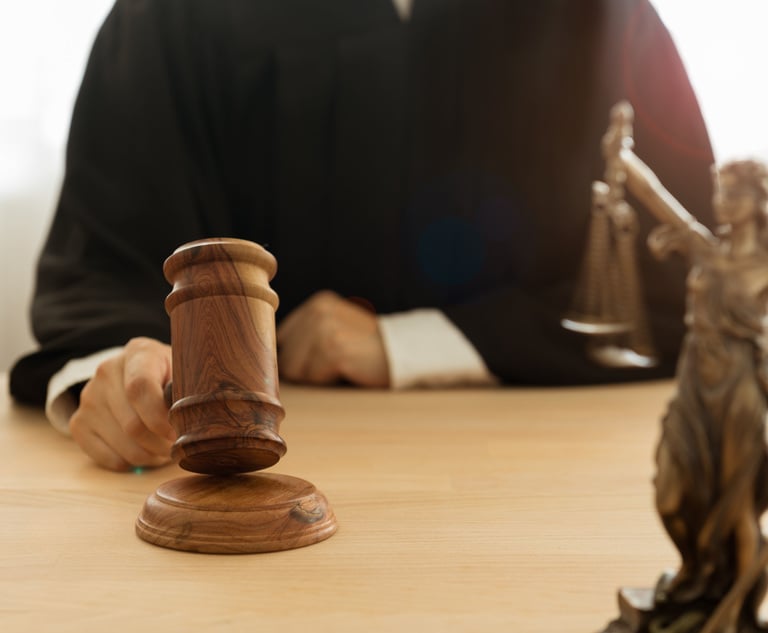In 4-3 Ruling, Justices Withhold Qualified Immunity for Officer Who Shot Suspect
Conflicting accounts of what occurred at the time of the shooting must be submitted to a jury for resolution, and then a trial court can determine the merits of the application for qualified immunity, the court said.
July 09, 2020 at 12:43 PM
4 minute read
 New Jersey Supreme Court Justice Barry Albin/photo by Carmen Natale/ALM
New Jersey Supreme Court Justice Barry Albin/photo by Carmen Natale/ALM
The New Jersey Supreme Court, in a 4-3 decision, ruled that a Camden police officer who shot a man who claimed he was surrendering is not entitled to qualified immunity from an excessive-force lawsuit.
The court said that the officer is not entitled to qualified immunity on summary judgment because the suspect and an independent witness each gave sworn testimony that his hands were empty and raised over his head when the officer shot him. The dissenting justices said that, under the totality of the circumstances, the officer's belief that deadly force was warranted was a reasonable one. Although the suspect discarded the handgun he was carrying while being chased by police, the officer did not see him drop the gun and had no reason to know that the suspect was no longer carrying a weapon.
The case that divided both the Supreme Court and an Appellate Division panel comes as the Black Lives Matter movement has focused attention on the impact of qualified immunity in police excessive-force cases. U.S. Supreme Court Justice Clarence Thomas has suggested that the high court revisit the doctrine of sovereign immunity, and states have been reexamining their laws on the subject.
In the Camden case, a trial judge afforded qualified immunity to the officer, Rafael Martinez, and granted summary judgment in his favor. The Appellate Division reversed, in a split ruling.
At the Supreme Court, Justice Barry Albin's majority opinion was joined by Chief Justice Stuart Rabner and Justices Jaynee LaVecchia and Walter Timpone.
Justice Lee Solomon issued a dissent, joined by Justices Anne Patterson and Faustino Fernandez-Vina.
Bryheim Baskin was shot after he crashed his car into an unmarked police vehicle and fled the scene on foot, armed with a handgun. Martinez gave chase and eventually cornered Baskin in a walled-in backyard, shooting him in the abdomen.
Martinez asserted that when he caught up with Baskin, he turned toward the officer and pointed an object that looked like a gun. Fearing for his life, Martinez said he fired his weapon. Although no gun was found where Baskin fell, two cellphones were located nearby.
Albin said at the summary judgment stage, when deciding whether qualified immunity applies, the evidence must be viewed in the light most favorable to Baskin. Therefore, the court must accept as true the testimony of Baskin and the independent witness.
"Under that scenario, a police officer would not have had an objectively reasonable basis to use deadly force. The law prohibiting the use of deadly force against a non-threatening and surrendering suspect was clearly established, as evidenced by cases in jurisdictions that have addressed the issue. Thus, Detective Martinez was not entitled to qualified immunity on summary judgment," Albin wrote.
Albin said the conflicting accounts of what occurred at the time of the shooting must be submitted to a jury for resolution.
"After the jury makes its ultimate findings, the trial court can determine the merits of the application for qualified immunity," Albin wrote.
But Solomon said that, even if Baskin's account of the events is accepted as true for purposes of summary judgment, Martinez reasonably believed that he confronted an armed and dangerous suspect who posed an immediate threat to his life when he shot Baskin. Before he was apprehended, Baskin threatened the lives of police officers and the general public by speeding away from a police vehicle and crashing in to another, then, armed with a gun, leading police on a foot chase though a residential neighborhood in the middle of the afternoon.
"Baskin thus openly … exhibited a total willingness to commit dangerous acts against police officers and displayed an apparent disregard for innocent bystanders," Solomon wrote. "Additionally, Baskin posed an immediate threat because he was in possession of a handgun while actively resisting arrest. Those facts reasonably led Martinez to conclude that Baskin, who had committed serious crimes involving the infliction or threatened infliction of serious physical harm—crashing into a police vehicle in an attempt to escape—was dangerous and willing to use deadly force against the officer and others."
The city attorney's office declined to comment on the ruling. Paul Melletz, who represented Baskin, could not be reached.
This content has been archived. It is available through our partners, LexisNexis® and Bloomberg Law.
To view this content, please continue to their sites.
Not a Lexis Subscriber?
Subscribe Now
Not a Bloomberg Law Subscriber?
Subscribe Now
NOT FOR REPRINT
© 2025 ALM Global, LLC, All Rights Reserved. Request academic re-use from www.copyright.com. All other uses, submit a request to [email protected]. For more information visit Asset & Logo Licensing.
You Might Like
View All


Judge Jablonski and Chief Justice Rabner Both Acted Completely Properly
4 minute read
In 2-1 Ruling, Court Clears Way for Decade-Old Wrongful Imprisonment Suit
5 minute readTrending Stories
Who Got The Work
J. Brugh Lower of Gibbons has entered an appearance for industrial equipment supplier Devco Corporation in a pending trademark infringement lawsuit. The suit, accusing the defendant of selling knock-off Graco products, was filed Dec. 18 in New Jersey District Court by Rivkin Radler on behalf of Graco Inc. and Graco Minnesota. The case, assigned to U.S. District Judge Zahid N. Quraishi, is 3:24-cv-11294, Graco Inc. et al v. Devco Corporation.
Who Got The Work
Rebecca Maller-Stein and Kent A. Yalowitz of Arnold & Porter Kaye Scholer have entered their appearances for Hanaco Venture Capital and its executives, Lior Prosor and David Frankel, in a pending securities lawsuit. The action, filed on Dec. 24 in New York Southern District Court by Zell, Aron & Co. on behalf of Goldeneye Advisors, accuses the defendants of negligently and fraudulently managing the plaintiff's $1 million investment. The case, assigned to U.S. District Judge Vernon S. Broderick, is 1:24-cv-09918, Goldeneye Advisors, LLC v. Hanaco Venture Capital, Ltd. et al.
Who Got The Work
Attorneys from A&O Shearman has stepped in as defense counsel for Toronto-Dominion Bank and other defendants in a pending securities class action. The suit, filed Dec. 11 in New York Southern District Court by Bleichmar Fonti & Auld, accuses the defendants of concealing the bank's 'pervasive' deficiencies in regards to its compliance with the Bank Secrecy Act and the quality of its anti-money laundering controls. The case, assigned to U.S. District Judge Arun Subramanian, is 1:24-cv-09445, Gonzalez v. The Toronto-Dominion Bank et al.
Who Got The Work
Crown Castle International, a Pennsylvania company providing shared communications infrastructure, has turned to Luke D. Wolf of Gordon Rees Scully Mansukhani to fend off a pending breach-of-contract lawsuit. The court action, filed Nov. 25 in Michigan Eastern District Court by Hooper Hathaway PC on behalf of The Town Residences LLC, accuses Crown Castle of failing to transfer approximately $30,000 in utility payments from T-Mobile in breach of a roof-top lease and assignment agreement. The case, assigned to U.S. District Judge Susan K. Declercq, is 2:24-cv-13131, The Town Residences LLC v. T-Mobile US, Inc. et al.
Who Got The Work
Wilfred P. Coronato and Daniel M. Schwartz of McCarter & English have stepped in as defense counsel to Electrolux Home Products Inc. in a pending product liability lawsuit. The court action, filed Nov. 26 in New York Eastern District Court by Poulos Lopiccolo PC and Nagel Rice LLP on behalf of David Stern, alleges that the defendant's refrigerators’ drawers and shelving repeatedly break and fall apart within months after purchase. The case, assigned to U.S. District Judge Joan M. Azrack, is 2:24-cv-08204, Stern v. Electrolux Home Products, Inc.
Featured Firms
Law Offices of Gary Martin Hays & Associates, P.C.
(470) 294-1674
Law Offices of Mark E. Salomone
(857) 444-6468
Smith & Hassler
(713) 739-1250






